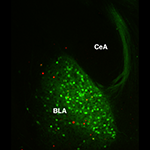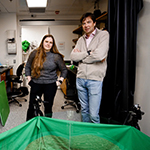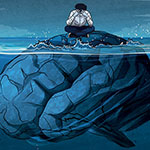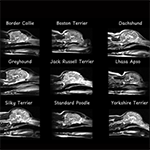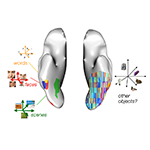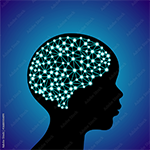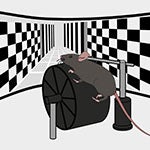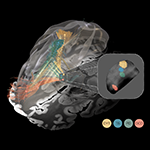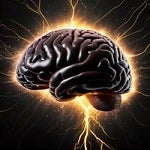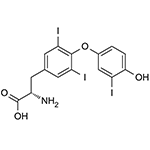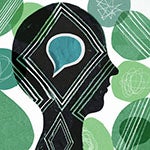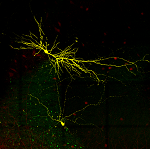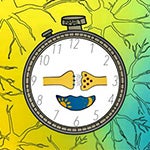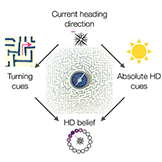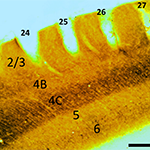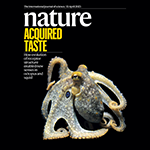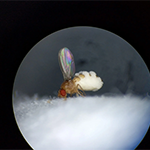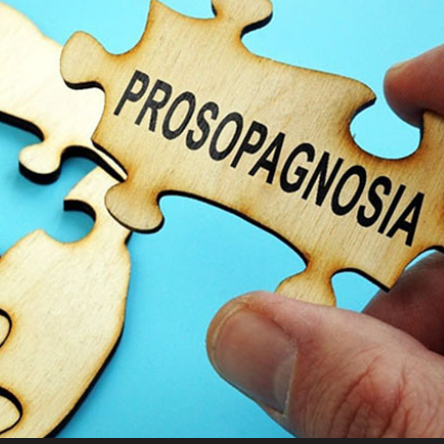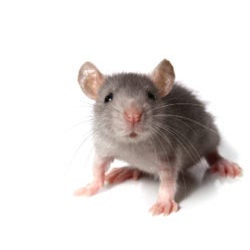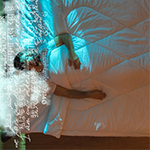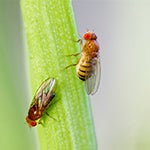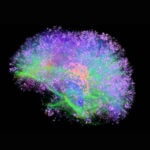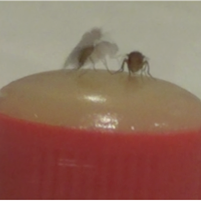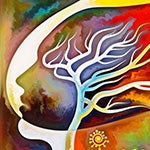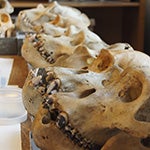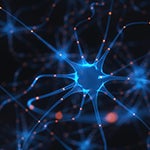Neuro Topics - Cognitive and Behavioral Neuroscience
SEARCH OTHER RESEARCH AREAS
October 16, 2025
The fight against addiction is a fight against memory. Junghyup (Jung) Suh shares findings that the relapse circuit in alcohol addiction consists of two separate “wires” or outputs coming out of the basolateral amygdala, a key brain region for emotional memories. One wire is responsible for forming the addiction memory, and the other for triggering alcohol-seeking behavior. This precise mapping opens the door for potentially more targeted treatment approaches to relapse in the future.
Original article in: Molecular Psychiatry >
August 21, 2025
New research from Naoshige Uchida, Jan Drugowitsch and colleagues, first author Michael Bukwich, provides an unprecedented look at how the brain makes foraging decisions—choices between sticking with a dwindling resource or venturing elsewhere. By identifying a neural signal that closely tracks a foraging-style integrator model, the study bridges the gap between high-level theories of decision-making and real-time brain activity.
Original article in: Neuron >
August 21, 2025
New research from Tomer Ullman and Halely Balaban finds that humans can track a handful of objects visually, but our imaginations can only handle one.
Original article in: Nature Communications >
May 28, 2025
Astrocytes are the most abundant non-neuronal cell type in the brain, though the mechanisms they use to communicate with neurons remains unclear. A new study from Florian Engert (Harvard), Misha Ahrens (Janelia) and colleagues, first author Alex B Chen. has identified a role for astrocytes in implementing feedforward inhibition over slow timescales and filled in critical molecular details in a biochemical pathway that astrocytes use to signal to neurons
Original article in: Science >
May 21, 2025
For many years, researchers have debated whether language in humans emerged through the evolution of gestural communication or vocal communication. Erin Hecht shares new data from chimpanzee research supporting a model where both modalities together contributed.
Original article in: Nature Communications >
May 19, 2025
New research from Adam Cohen and colleagues, first author Doyeon Kim, has unveiled a way to map the molecular underpinnings of how learning and memories are formed, a groundbreaking new technique expected to offer insights that may pave the way for new treatments for neurological disorders such as dementia.
Original article in: Nature Neuroscience >
April 17, 2025
New AI method lets researchers get better handle on brain-behavior link, and may offer insights into disorders like autism. From Bence P. Ölveczky and colleagues. Co-first authors Ugne Klibaite and Tianqing Li.
Original article in: Cell >
April 17, 2025
After a bout of infection or an autoimmune disease flare-up, some people experience prolonged mood swings, emotional dysregulation, and changes in behavior. HMS News highlights two new studies from the teams of Jun Huh (HMS) and Gloria Choi (MIT), detailing the steps of an intricate brain-immune crosstalk that accounts for this long-known but poorly understood observation.
April 1, 2025
New research from Naoshige Uchida, Sam Gershman, Venkatesh Murthy and colleagues, co-first authors Lechen Qian and Mark Burrell shows that dopamine signals and behavior are shaped by prospective contingency—the information a cue provides about the change in likelihood of receiving a future reward, not simply reward frequency. The concept of contingency is crucial in understanding learning, behavior, and decision-making processes.
Original article in: Nature Neuroscience >
March 21, 2025
Have you ever had the sense that the person you’re talking to is just a “robot”? That they’re following some script without thinking about it? New research by Ilona Bass and Tomer Ullman examines the detection of automatic behavior in other people, finding it is a common and robust phenomenon across domains.
Original article in: American Psychologist >
March 14, 2025
When faced with an unfamiliar threat, animals must make split-second decisions: should they flee to avoid potential harm or push forward in pursuit of a reward? New research from Nao Uchida and colleagues, first author Iku Tsutsui-Kimura, shows how the mouse brain dynamically regulates avoidance behaviors by balancing competing neural signals.
Original article in: Nature >
March 14, 2025
The mechanics of how loneliness or instinctive social need is encoded in the brain are unclear. New research from from Catherine Dulac and colleagues, first author Ding Liu (Dulac and Uchida labs) explores the neurological basis for this need, uncovering the systems that govern the desire for company.
Original article in: Nature >
December 10, 2024
Sophie Barton shares new research investigating how humans may have unwittingly altered the brain morphology of domestic dogs through selective breeding for head shape. Dogs with extreme head shapes show widespread reductions in gray matter volume across the brain.
Original article in: Journal of Comparative Neurology >
November 18, 2024
Brain regions that preferentially process faces, places, and words may emerge naturally from exposure to diverse images, without requiring built-in structures dedicated to specific categories. By training AI models to distinguish images based on visual differences alone, researchers found that brain-aligned category-selective neurons emerged spontaneously in the model.
October 11, 2024
Up to 10 percent of the population has dyslexia, yet many children are diagnosed only after struggling with reading for years. EarlyBird, a product that grew from research at Boston Children’s Hospital and incubated in the hospital’s Innovation & Digital Health Accelerator (IDHA), can identify children at risk for dyslexia before they start formal reading instruction, then help them build the skills they need in a fun game format.
August 27, 2024
A lot is unknown about how brain circuits develop and mature in babies and toddlers. Carol Wilkinson shares new data on developmental trajectories of EEG activity from 0-3 years—revealing age-dependent, nonlinear changes in periodic alpha and beta brain waves that are suggestive of distinct milestones in circuit maturation.
Original article in: Nature Communications >
August 6, 2024
Joe Kossowsky and colleagues (first author Danielle A Wallace) found that participants who spent more time in bright light had more regular sleep, and that more regular sleep was associated with lower depression symptoms and lower odds of mild or severe depression
Original article in: JAMA Network Open >
July 3, 2024
Scientists create realistic virtual rodent with digital neural network to study how the brain controls complex, coordinated movement.
Original article in: Nature >
July 3, 2024
Chronic loneliness was associated with higher stroke risk independent of depressive symptoms or social isolation. Addressing loneliness may have an important role in stroke prevention, and repeated assessments of loneliness over time may help identify those particularly at risk.
Original article in: eClinicalMedicine >
May 9, 2024
Just talking to other people can stimulate different brain functions among socially isolated older adults, even when the interactions are internet-based, according to a new clinical trial out of Massachusetts General Hospital.
Original article in: The Gerontologist >
April 24, 2024
A hallmark of anorexia nervosa is the willful seeking and maintenance of a starvation state, potentially as a means to cope with stressful life experiences or trauma. Hakan Kucukdereli and Mark Andermann share their research on how they designed a virtual reality paradigm to study this phenomenon in mice.
Original article in: Neuron >
April 22, 2024
A new study led by researchers at McLean Hospital and Washington State University used advances in digital testing to demonstrate that naturally occurring glucose fluctuations impact cognitive function in people with type 1 diabetes (T1D).
Original article in: NPJ Medicine >
April 22, 2024
The Harvard Gazette profiles the work of the lab of Nadine Gaab, specifically their ongoing BabyBOLD study. Gaab’s team enrolls infants between 3 and 8 months with familial risk for reading disabilities. They found that some atypical brain characteristics involving white matter (where information and communication is exchanged), connectivity patterns, and other measurements found in older children are already present as early as infancy.
April 15, 2024
Deep brain stimulation is a powerful therapeutic approach for severe brain circuit dysfunctions that can effectively alleviate the heterogeneous symptoms characteristic of Parkinson’s disease, dystonia, Tourette’s syndrome, and obsessive-compulsive disorder. Barbara Hollunder (Lab of Andreas Horn) explains what invasive brain stimulation can teach us about the circuit architecture of the brain’s dysfunction — and which commonalities it shares with a prism.
Original article in: Nature Neuroscience >
March 22, 2024
The mind can wander and uncouple from the present experience of the body, but how does it snap back into the present? Jordan Farrell shares new research that points towards a brain circuit phenomenon that may explain this shift.
Original article in: Nature >
March 8, 2024
Thyroid signaling plays a central role in metabolism. Ralph Lawton and Daniel Hochbaum of the Sabatini Lab share new research revealing it may regulate human behavior and other important components of health as well.
Original article in: PNAS >
February 8, 2024
The Uchida lab used a genetically encoded glutamate sensor to examine the pattern of glutamate inputs to dopamine neurons in mice. Combining the results with existing knowledge about GABA signaling to these neurons, they gained a new understanding of how these two neurotransmitters collaborate to bring dopamine neurons the information they need to encode reward prediction error (RPE)—the difference between expected and received rewards.
Original article in: Neuron >
February 8, 2024
Researchers from Massachusetts General Hospital demonstrate how neurons in the human brain work together to allow people to think about what words they want to say and then produce them aloud through speech. The findings provide a detailed map of how speech sounds such as consonants and vowels are represented in the brain well before they are even spoken and how they are strung together during language production.
Original article in: Nature >
February 6, 2024
Yu-Tzu Shih, Jason Alipio, and Amar Sahay share new research on the autism linked gene Dyrk1a. They find that developmental differences in neural circuitry and social cognition observed in mutant mice with only one copy of the Dyrk1a gene can be rescued by targeting inhibitory neuron plasticity in adulthood.
Original article in: Neuron >
January 25, 2024
Cognitive psychology researchers at Harvard University have discovered that creative writing involves the integration of semantically distant ideas with perceptually descriptive information. Furthermore, current large language models are able to generate short stories that are comparable in creativity to those written by humans.
Original article in: Journal of Creative Behavior >
October 26, 2023
The time of day influences cognition, but the molecular and synaptic mechanisms of this influence are elusive. We show that the circadian clock protein BMAL1 has a rhythm in synapses that is critical for corresponding rhythms in synaptic plasticity. Our findings point to local mechanisms for gating computations in anticipation of the time of day.
Original article in: Science Advances >
August 30, 2023
HMS News article on new research from Chris Harvey, Mike Greenberg, and colleagues, first author Jonathan Green. They identified a specific group of neurons in a brain region involved in navigation that undergo bursts of activity when mice running a maze veer off course and correct their error.
Original article in: Nature >
July 21, 2023
Harvard Gazette article on new research from Sam Gershman and colleagues, first author Momchil Tomov, using fMRI and video games to test ideas about complex decision-making.
Original article in: Neuron >
June 16, 2023
Harvard Gazette Q+A with JoAnn Manson, who along with Howard Sesso, co-led a collaboration between BWH and HSPH called the the COSMOS-Web Study. This study showed that among 3,500 subjects 60 and older, a daily multivitamin led to 3.1 years less cognitive aging than for those assigned a placebo. This clinical study was the second cognition trial in COSMOS to suggest that multivitamins can slow memory loss.
Original article in: American Journal of Clinical Nutrition >
June 16, 2023
Uncertainty is a feature, rather than a flaw, and it can help us weigh internal beliefs against external sensory evidence. In this study, Anna Kutschireiter and colleagues in the Drugowitsch lab investigated how ring attractor networks, popular models for working memory, can represent and compute with uncertainties.
Original article in: PNAS >
June 7, 2023
Rick Born shares new research where neural recordings in animals trained on perceptual tasks failed to reveal the “usual suspects” of task-related signals in early visual cortex. This surprising negative finding has forced us to re-think exactly what these signals mean.
Original article in: Journal of Neurophysiology >
May 11, 2023
Harvard MCB Department news article on new research from Venkatesh Murthy and colleagues, co-first authors Alice Berners-Lee and Elizabeth Shtrahman, examining how odor mixtures are represented in the piriform cortex of mice while they learn to discriminate a unique target odor mixture from hundreds of other odor mixtures. They found that with time the target mixture becomes over-represented--meaning more neurons of this brain region become selective for the target odor mixture than they were at
Original article in: PLOS Biology >
April 20, 2023
The lab of Nick Bellono, along with colleagues at UC San Diego and UT Southwestern Medical Center, recently published two papers in Nature describing the path of divergent sensing capabilities in cephalopods by tracking their evolutionary lineage from common ancestral neurons.
Original article in: Nature >
April 20, 2023
Harvard Gazette article profiling the research of postdoc Carolyn Elya (lab of Benjamin de Bivort) into how a parasitic fungus hijacks the nervous system of flies and uses mind control to manipulate behavior as the insects near death
March 31, 2023
The lab of Bob Datta was featured in the New York Times for their recent study finding that the behavior of male mice is more unpredictable than that of females, challenging century-old assumptions used to exclude females from research because of their hormones.
Original article in: Current Biology >
March 31, 2023
HMS News article on new research from Brad Manor and colleagues, co-first authors Junhong Zhou and Gabriele Cattaneo, finding that that the ability to dual-task when walking starts to decline by the age of 55, up to a decade before old age, as traditionally defined by the threshold of 65 years.
Original article in: Lancet Healthy Longevity >
March 31, 2023
HMS News article on new research from Sharon K Inouye and colleagues suggesting that delirium — the most common postoperative complication in older adults — is associated with a 40 percent faster rate of cognitive decline in those who develop delirium over those who do not.
Original article in: JAMA Internal Medicine >
March 9, 2023
HMS News article on new research from Joseph DeGutis and colleagues suggesting that as many as one in 33 people (3.08 percent) may meet the criteria for face blindness, or prosopagnosia.
Original article in: Cortex >
March 3, 2023
Harvard Gazette article on new research from Yun Zhang and colleagues, co-first authors Taihong Wu and Minghai Ge, illuminating how pathogens — and pheromones — alter social behavior in animals.
Original article in: Nature >
February 24, 2023
HMS News article on new research from Aaron Baggish and the Football Players Health Study at Harvard University, first author Rachel Grashow. The odds that former professional football players will be diagnosed with high blood pressure — a known risk factor for cardiovascular and cognitive dysfunction — rises in step with the number of concussions the athletes sustained during their careers
Original article in: Circulation >
February 24, 2023
Harvard Gazette article on new research from Jeremy Wolfe and colleagues, showing that while people often think their memory is terrible, they can recall where and when an object appeared with good, if not perfect, precision for a large number of objects.
Original article in: Current Biology >
February 24, 2023
Harvard Gazette article on new research from Susan Carey and colleagues, first author Brian Leahy, on the developmental psychology of 3-year-olds. They found that they struggle to keep track of competing options and instead they "find one state that is merely possible and treat it as fact."
Original article in: PNAS >
December 8, 2022
Harvard Gazette article spotlighting a new course taught by Erin Hecht investigating canine behavior and what it can tell us about ours.
December 8, 2022
Harvard Gazette article on new research from Elizabeth A. Kensinger and colleagues, first author Tony Cunningham, validating the impact major political events can have on sleep and how it affects the public’s collective mood, well-being, and alcohol consumption.
Original article in: Sleep Health >
October 14, 2022
Harvard Gazette article on new research from Judith Owens and colleagues, first author Rebecca Robbins, surveying parents and caregivers and finding that more than two-thirds of those surveyed believed in the top three most salient myths about sleep.
Original article in: Sleep Health >
September 29, 2022
HMS News article interviewing Margaret Livingstone about a recent publication highlighting observations of macaque mothers over 10 years, with surprising new insights into how the mothers form attachments to their newborns.
Original article in: PNAS >
September 29, 2022
Harvard MCB News article on new research from Nao Uchida, Mitsuko Watabe-Uchida, and colleagues, first author Korleki Akiti, second author Iku Tsutsui-Kimura, identifying a neural circuit that plays a key role in deciding whether the animals engage with or avoid novel stimuli.
Original article in: Neuron >
September 20, 2022
Round up of awards and honors earned by the HBI Community
June 30, 2022
Harvard Gazette article on new research from Sydney Cash, Leigh R. Hochberg, and colleagues, first author Daniel B. Rubin, may help explain how humans form memories and learn, and could eventually aid the development of assistive tools for people affected by neurologic disease or injury.
Original article in: Journal of Neuroscience >
June 15, 2022
Harvard Gazette article on new research from Charles Czeisler and colleagues, first author Jeanne F Duffy, showing that administering a 5 mg dose of melatonin increased total sleep time compared to a placebo in a small group of healthy adults aged 55 and older.
Original article in: The Journal of Pineal Research >
June 15, 2022
Mass. General Hospital Advances in Motion article on new research from Randy Buckner and colleagues, co-first authors Constanza M. Vidal Bustamante and Garth Coombs III, determining in an intensive full-year study of elite first-year college students that frequent social stress is more likely than academic stress to be associated with subsequent psychological problems.
Original article in: Scientific Reports >
June 15, 2022
HMS News article on new research from Laura Barger and colleagues, first author Matthew Weaver, using national surveys of residents before and after a 16 hour shift limit on new medical residents was enacted in 2011, find that reported medical errors and adverse events dropped by more than a third, and medical errors resulting in patient death declined by almost two-thirds.
Original article in: BMJ Quality & Safety >
June 15, 2022
Harvard Gazette article on what language a bilingual or multilingual person is most likely to dream in and why.
June 15, 2022
Harvard Gazette Article on a recent conversation with author W.A Harris and Josh Sanes about Harris's book Zero to Birth: How the Human Brain Is Built. In his book, Harris elucidates how one cell develops into the complex operational centers that not only make us human, but also individuals, with entirely unique traits, behaviors, and malfunctions.
June 15, 2022
Harvard Health Publishing article on how a deluge of traumatic news is affecting us. Our responses to the pandemic and continuous uncertainty, fueled by doomscrolling and newsfeeds, range from hyperactivation (fight or flight) to numbness (freeze).
June 15, 2022
Harvard Gazette article on new research from Mohammad Jalali and colleagues, first author Tse Yang Lim (MIT), capturing how the interconnections between stages of prescription and illicit opioid use, from initiation and addiction treatment to relapse and overdose mortality, have evolved over time.
Original article in: PNAS >
March 8, 2022
Harvard Gazette article on new research from Elizabeth Spelke and colleagues at MIT, first author Ashley Thomas, suggesting infants view kissing or sharing food or utensils as social cues indicating close relationships.
Original article in: Science >
January 7, 2022
Emotional eating is known to be a contributing factor to overeating and can potentially lead to obesity or disordered eating. Laura Holsen shares new research showing how differential responsivity to stress may increase the risk of developing maladaptive eating behavior.
Original article in: Appetite >
September 29, 2021
Harvard Gazette article summarizing a recent online lecture by Carole Hooven on the wide-reaching effects of testosterone in the human body, and across society, powering acts of aggression, violence, and the large disparity in their commission between men and women.
September 29, 2021
Harvard MCB Department News article on new research from the lab Aravi Samuel, first author Vladislav Susoy, using whole-brain calcium imaging to examine the mechanisms behind the mating behavior of male worms at single-neuron resolution.
Original article in: Cell >
September 14, 2021
Harvard MCB News article on new research from the lab of Catherine Dulac, first author Anita Autry (Albert Einstein College of Medicine; former postdoc in the Dulac lab), identifying hypothalamic neurons activated during infant-directed attacks in males and females, but not other behaviors.
Original article in: eLife >
August 30, 2021
Beth Israel Deaconess Medical Center press release on new research from the lab of Mark Andermann, first author Stephen X. Zhang, uncovering the precise hypothalamic neurons that regulate the drive to engage in mating behaviors in mice.
Original article in: Nature >
July 29, 2021
Round up of awards and honors earned by the HBI community.
July 9, 2021
Stephen Zhang shares new research from the labs of Mike Crickmore and Dragana Rogulja showing that young male flies have functional courtship circuitry, but the motivation to mate is suppressed by a hormone until maturity.
Original article in: Science Advances >
July 7, 2021
Harvard Gazette article on new research from Erin Hecht and colleagues from the U.S and Russia demonstrating that foxes bred to be tame saw similar increases in gray matter volume as foxes bred to be aggressive when compared to a control group. This suggests that selection for opposite behaviors can influence brain morphology in a similar way.
Original article in: Journal of Neuroscience >
July 7, 2021
Harvard Gazette article announcing the founding of the Center for the Neuroscience of Psychedelics at Massachusetts General Hospital, to be led by Jerrold Rosenbaum.
June 4, 2021
Rachel Monyak and Edward Kravitz share new research characterizing a line of masculinized female flies that switches its style of fighting based on the sex of its opponent. This work furthers our understanding of factors that initiate fighting and offers clues as to why flies use male or female aggressive strategies.
Original article in: Journal of Experimental Biology >
June 4, 2021
Harvard Gazette Q+A with David R. Williams on the mental and physical tolls discrimination take on Black lives and what individuals can do to help mitigate them.
June 4, 2021
Harvard Gazette article profiling the research of Deirdre Barrett into how our dreams have changed during the COVID-19 pandemic.
June 4, 2021
Harvard Gazette article on new research from a collaboration of more than 50 international scientists finding that Neanderthals and ancient humans adapted to eating starch-rich foods as far back as 100,000 years ago.
Original article in: PNAS >
February 8, 2021
HMS News article on new research from the lab of Ziv Williams and colleagues at MIT, first author Mohsen Jamali, identifying the specific neurons critical for social reasoning. Also featured in the Harvard Gazette.
January 28, 2021
Round up of awards and honors earned by the HBI community.


